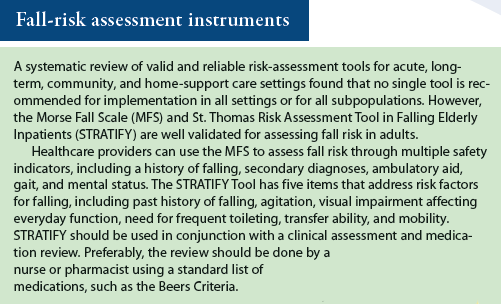7 Simple Techniques For Dementia Fall Risk
7 Simple Techniques For Dementia Fall Risk
Blog Article
Some Ideas on Dementia Fall Risk You Need To Know
Table of ContentsThe Facts About Dementia Fall Risk RevealedNot known Facts About Dementia Fall RiskThe 5-Minute Rule for Dementia Fall RiskThe Ultimate Guide To Dementia Fall RiskWhat Does Dementia Fall Risk Mean?
Nonetheless, based on symptoms and signs, such as proof of head injury or a brand-new focal neurologic deficit, calculated tomography or MRI of the mind might be suggested - Dementia Fall Risk. An analysis for sources of syncope must be carried out just if there is solid uncertainty, as when it comes to reoccurring, inexplicable drops
Health care suppliers utilize a fall risk assessment to recognize your danger factors for dropping and make helpful referrals. A fall danger assessment is vital since knowing which variables increase your opportunities of falling aids you: Minimize your threat of dropping or injuring yourself.
Maximize your capacity to move and be active. Maintain a healthy, independent life. All grownups 65 years and older should have an initial loss threat screening. Your healthcare provider might ask you whether you: Feel unsteady when standing or strolling. Have fallen in the past year. Worry about dropping. If you address yes to any of these questions, your health care supplier will recommend an additional, much more detailed assessment.
The 7-Second Trick For Dementia Fall Risk

, and objectives particularly tailored to people that are at danger for drops. A is defined as an event that results in a person coming to relax unintentionally on the ground or flooring or other reduced level (THAT, 2021).
Falling is the 2nd leading cause of fatality from unintentional injuries around the world. It is approximated that fall fatality Extra resources prices in the U.S
Some Known Details About Dementia Fall Risk
If this rate continues, the CDC prepares for seven fall deaths every hour by 2030.
Each year, over 800,000 clients are hospitalized due to the fact that of drops. Nurses play a significant function in avoiding drops for their people through education, examining fall danger, producing much safer atmospheres, and offering treatments in preventing injuries from falls.
Client will demonstrate careful prevention steps. Patient and caregivers will implement strategies to enhance safety and security and protect against falls in the home. Loss result from numerous variables, and an alternative method to the private and setting is very important. Intend a person is considered at high danger for drops after the screening.
Dementia Fall Risk Fundamentals Explained
A calls for using a verified device that scientists have actually checked out to be helpful in naming the causes of falls in an individual. The degree of autumn danger can be figured out making use of the evaluation of innate and external aspects.
People are much more most likely to fall once again if they have actually sustained one or even more drops in the previous six months. The older population is at enhanced danger of fall-related readmissions based upon a study identifying the factors predictive of repeat falls connected results additional reading (Prabhakaran et al., 2020). Persons with impaired awareness and disorientation might not recognize where they are or what to do to aid themselves.
In addition, complication and impaired judgment boost the client's chance of dropping. The capacity of individuals to secure themselves from falls is affected by such variables as age and advancement. Older individuals with weak muscle mass are more most likely to fall than those that keep muscle mass toughness, versatility, and endurance. These modifications include reduced aesthetic function, click over here damaged color understanding, change in facility of gravity, unsteady gait, reduced muscle mass strength, decreased endurance, modified deepness assumption, and delayed action and response times.
An Unbiased View of Dementia Fall Risk
Less contrast level of sensitivity was rather linked with both increased rates of falls and other injuries, while reduced aesthetic skill was just related to boosted loss price (Timber et al., 2011). Sensory understanding of ecological stimulations is paramount to safety and security. Vision and listening to problems restriction the individual's ability to perceive risks in the surroundings.
Older grownups who have poor balance or problem strolling are much more likely to fall., or various other clinical problems and treatments., and use of psychotropic drugs (Stanmore et al., 2013).
Report this page